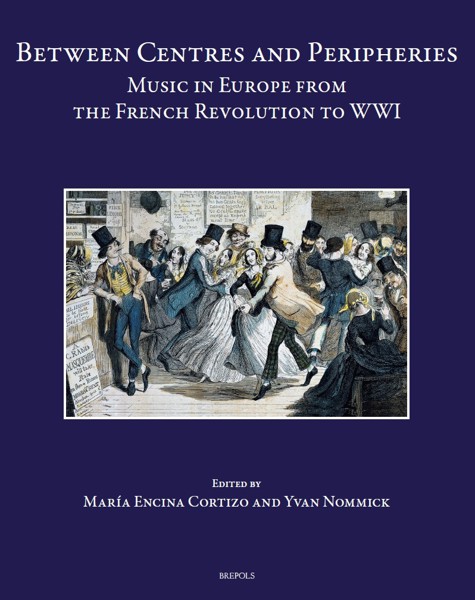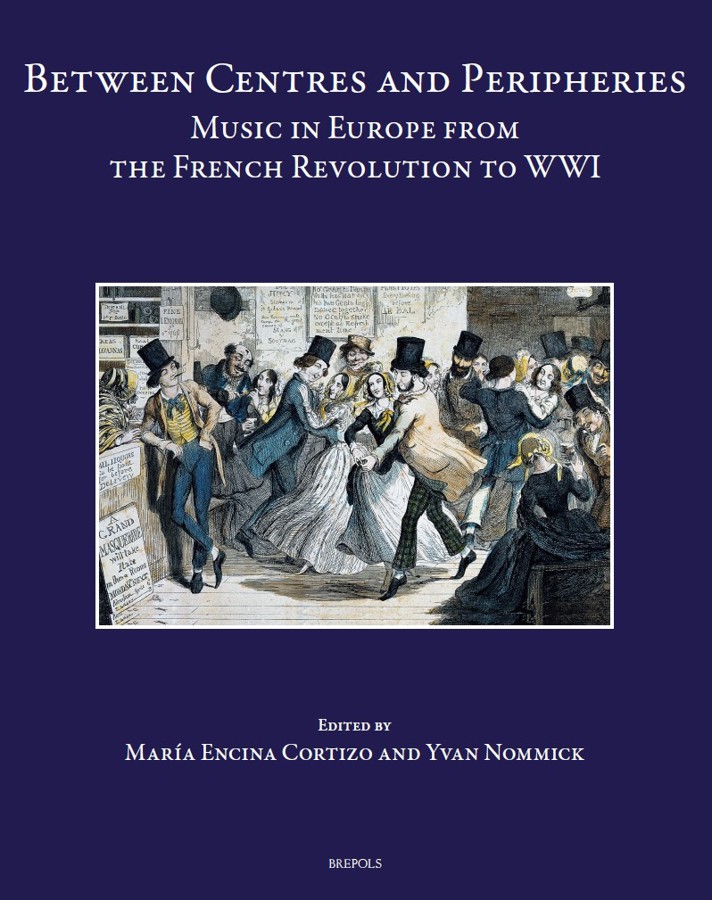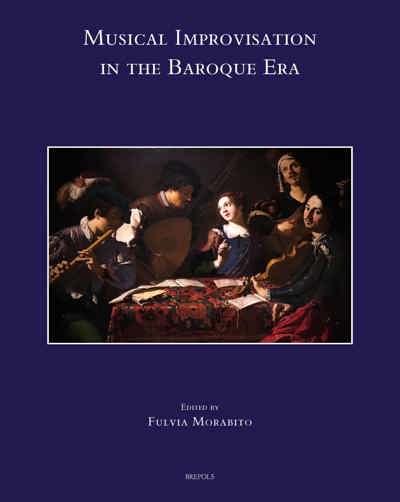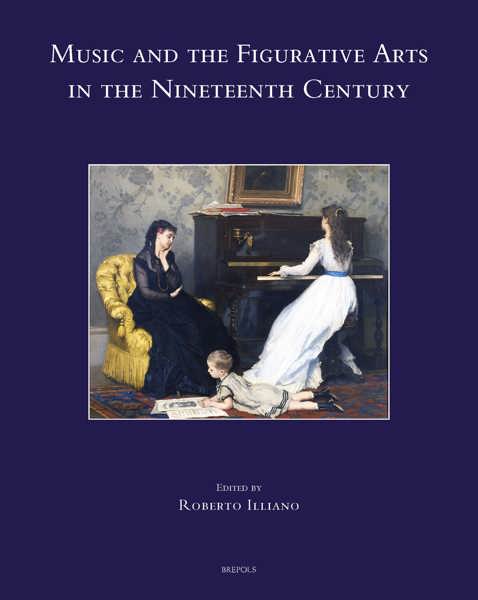
Between Centres and Peripheries
Music in Europe from the French Revolution to WWI
María Encina Cortizo, Ivan Nommick (eds)
- Pages: xiv + 434 p.
- Size:210 x 270 mm
- Illustrations:40 b/w
- Language(s):English, French, Spanish
- Publication Year:2023
- € 135,00 EXCL. VAT RETAIL PRICE
- ISBN: 978-2-503-60848-8
- Hardback
- Available
This volume focuses on the European musical life from the French Revolution to WWI
« (…) le contenu des chapitres est généralement d’un très grand intérêt. Les contributions présentent tantôt des synthèses, parfois fort utiles, autour d’un thème assez ample (un exemple parmi tous: le chapitre de Encina Cortizo et Sobrino sur l’émergence du topos de l’Espagne romantique au cours du XIXe siècle), tantôt les résultats de recherches pointues autour de cas spécifiques. Le portrait qui résulte de ce dialogue entre le général et le particulier est très riche et fait de ce volume une contribution importante à l’étude des relations culturelles entre pays européens et de la circulation des répertoires musicaux. » (Federico Lazzaro, dans Ad Parnassum, XXIII/44, 2025, p. 121)
"Once again, Brepols has produced an elegant and hefty volume of essays on European music. Like the over fifty previous entries in the Speculum Musicae series, the present volume began life as a conference, features contributions of varying lengths and languages (here English, French, and Spanish)..." (Jacek Blaszkiewicz, in Music & Letters, [published online] October 2025)
María Encina Cortizo is Professor of Musicology at the University of Oviedo (Spain), coordinating the ‘Erasmus’ Research Group. Her main field of research is zarzuela and Spanish opera in the nineteenth and the early twentieth centuries. She has contributed to Die Musik in Geschichte und Gegenwart (MGG) and the Diccionario de la Música Española e Hispanoamericana. She also authored several musicological studies and editions of Spanish Operas and Zarzuelas.
Ivan Nommick has taught conducting in the Schola Cantorum in Paris. He was Director of the Archivo Manuel de Falla (Granada), and director of artistic studies at the Académie de France à Madrid (Casa de Velázquez). Since 2011 he has been Professor of Musicology at University Paul-Valéry Montpellier 3 (France). His primary focus of research is the analysis and history of 19th and 20th century music, the study of the creative process in music and the relationship between music and the visual arts.
This volume revisits the artificial and enormously limiting historiographical concepts of centre and periphery in European musical life throughout the long 19th century and until the outbreak of the First World War. In this period, music played a prominent role, and cities such as Paris, Vienna, Milan or London, real laboratories of artistic creation, became social and cultural references for the rest of the continent, whose inhabitants strove to imitate their musical habits such as concert and theatrical life, soirées, parties or musical promenades. From diverse perspectives, this volume rethinks the singularity, influence and connections of different European musical centres, analysing the reproduction of cultural models and the conflicts that these models imposed on the peripheries, most of which have been ignored in the historiography of Western European music. In addition, it will also address the birth of musico-national languages situated on the European geographical margins, that develop interesting synergies between universality and nationality. The peripheral models of musical production and circulation in contexts far from the usual musical venues will also be addressed, as well as the derived cultural transfers.
MARÍA ENCINA CORTIZO - YVAN NOMMICK
Preface
Redefining Centres in European Music
1. YVAN NOMMICK (Université Paul-Valéry, Montpellier 3)
Paris – Vienne, 1890-1914: singularités et convergences musicales
2. ÉTIENNE JARDIN (Palazzetto Bru Zane, Venice)
Les écoles de musique françaises sont-elles des succursales du Conservatoire?
3. NANCY NOVEMBER (The University of Auckland)
«Periphery» as Centre: Canon Formation and Arrangements of Public Music in the Early Nineteenth-Century Viennese Home
4. MARTINA KALSER-GRUBER (Danube University Krems)
Viennese Operetta Composers and their Publishers: A Love-Hate Relationship?
5. ALESSANDRA PALIDDA (Oxford Brooks University)
Music for the ‘Nation’: the Creation of a Transnational Musical Style between Paris and Republican Milan
Models of Music Production in the Peripheries: Universality vs. Nationality
6. MATTHIEU CAILLIEZ (Université Grenoble Alpes)
Le théâtre lyrique en Corse et en Algérie française au miroir de la presse musicale européenne (1830-1870)
7. IVANA VESIĆ (Institute of Musicology SASA, Belgrade)
For the ‘Authentic’ National and Aesthetic Values: the challenges of Music Production and Performance in the Kingdom of Serbia (1882-1914)
8. AXEL KLEIN (Research Associate, Research Foundation for Music in Ireland-RFMI)
Music in and from Ireland: Perspectives on an Ununited Kingdom
9. IVAN MOODY (CESEM – Universidade NOVA, Lisbon)
Centre and Periphery: Symphonic Identity in Portugal
10. KELVIN H. F. LEE (University of Leuven)
Form as a Relational Object: Two Stories of Metrical Dissonances, or a Music-Historiographical Lesson from George Enescu Circulation of Music in Different Contexts
Circulation of Music in Different Contexts
11. CLÉMENT NOËL (EHESS, Paris)
Le «Couronnement de la Muse du Peuple» de Gustave Charpentier: un théâtre citoyen à la rencontre des provinces françaises (1897-1914)
12. DAVID CONWAY (Honorary Research Associate, University College London)
Roma, Magyar, Jew: Complexities of Cultural Identity in the Spread of «Gypsy Music» in the Long Nineteenth Century
13. MARÍA ENCINA CORTIZO – RAMÓN SOBRINO (Universidad de Oviedo)
Peripheries in Dialogue: Grasping the Sounds of «L’Espagne Romantique» in the Nineteenth Century
14. MICHAEL CHRISTOFORIDIS (The University of Melbourne)
From Paris to the Ottoman Empire: Spanish Estudiantinas, the Popular Music Stage and Sonorities of the Belle Époque
15. MIRIAM PERANDONES LOZANO (Universidad de Oviedo)
Quinito Valverde: transculturalidad y modernidad en su obra europea (1907-1913) Cultural Transfer of Music
Cultural Transfer of Music
16. ROSEMARY GOLDING (The Open University)
On the Edges of Society: The Hidden Musical Cultures of Nineteenth-century British Lunatic Asylums
17. QUENTIN DISHMAN (University of Minnesota)
Singing la Patrie in Parisian Cafés: The «chanteuses patriotiques» (1870- 1889)
18. GLORIA A. RODRÍGUEZ-LORENZO (Universidad de Oviedo) – FRANCISCO J. GIMÉNEZ-RODRÍGUEZ (Universidad de Granada)
Between Hungary and Spain: Musical Encounters behind Europe
19. JOSÉ IGNACIO SUÁREZ GARCÍA (Universidad de Oviedo)
Relatos periféricos: Richard Wagner como instrumento narrativo en la literatura menor española del último tercio del siglo XIX
Abstracts and Biographies
Index of Names




